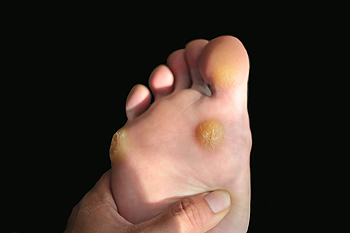 Plantar warts are bumps that form on the feet from the HPV virus. Plantar warts may be painful, and are typically contracted in places such as public swimming pools or gyms. There are various treatment options for this condition. The goal is to irritate the bump so your own immune system can attack it. On your own, you could buy salicylic acid or apple cider vinegar and apply it to the warts. Another at-home remedy is leaving a piece of duct tape on the wart, and pulling it off after a few days. If these options do not work, or if you want the warts gone quickly, you can see a podiatrist. The doctor can freeze, burn or cut the lesion, in order to initiate an immune system response. If your plantar warts are bothering you, or if you are not sure what the bumps on your feet are, be sure to see a podiatrist.
Plantar warts are bumps that form on the feet from the HPV virus. Plantar warts may be painful, and are typically contracted in places such as public swimming pools or gyms. There are various treatment options for this condition. The goal is to irritate the bump so your own immune system can attack it. On your own, you could buy salicylic acid or apple cider vinegar and apply it to the warts. Another at-home remedy is leaving a piece of duct tape on the wart, and pulling it off after a few days. If these options do not work, or if you want the warts gone quickly, you can see a podiatrist. The doctor can freeze, burn or cut the lesion, in order to initiate an immune system response. If your plantar warts are bothering you, or if you are not sure what the bumps on your feet are, be sure to see a podiatrist.
Plantar warts can be very uncomfortable. If you need your feet checked, contact one of our podiatrists from Pennsylvania Foot & Ankle. Our doctors will assist you with all of your foot and ankle needs.
About Plantar Warts
Plantar warts are the result of HPV, or human papillomavirus, getting into open wounds on the feet. They are mostly found on the heels or balls of the feet.
While plantar warts are generally harmless, those experiencing excessive pain or those suffering from diabetes or a compromised immune system require immediate medical care. Plantar warts are easily diagnosed, usually through scraping off a bit of rough skin or by getting a biopsy.
Symptoms
- Lesions on the bottom of your feet, usually rough and grainy
- Hard or thick callused spots
- Wart seeds, which are small clotted blood vessels that look like little black spots
- Pain, discomfort, or tenderness of your feet when walking or standing
Treatment
- Freezing
- Electric tool removal
- Laser Treatment
- Topical Creams (prescription only)
- Over-the-counter medications
To help prevent developing plantar warts, avoid walking barefoot over abrasive surfaces that can cause cuts or wounds for HPV to get into. Avoiding direct contact with other warts, as well as not picking or rubbing existing warts, can help prevent the further spread of plantar warts. However, if you think you have developed plantar warts, speak to your podiatrist. He or she can diagnose the warts on your feet and recommend the appropriate treatment options.
If you have any questions please feel free to contact one of our offices located in Bensalem, Pennsylvania, Port Richmond, Philadelphia, and Hamilton, New Jersey . We offer the newest diagnostic and treatment technologies for all your foot and ankle needs.
